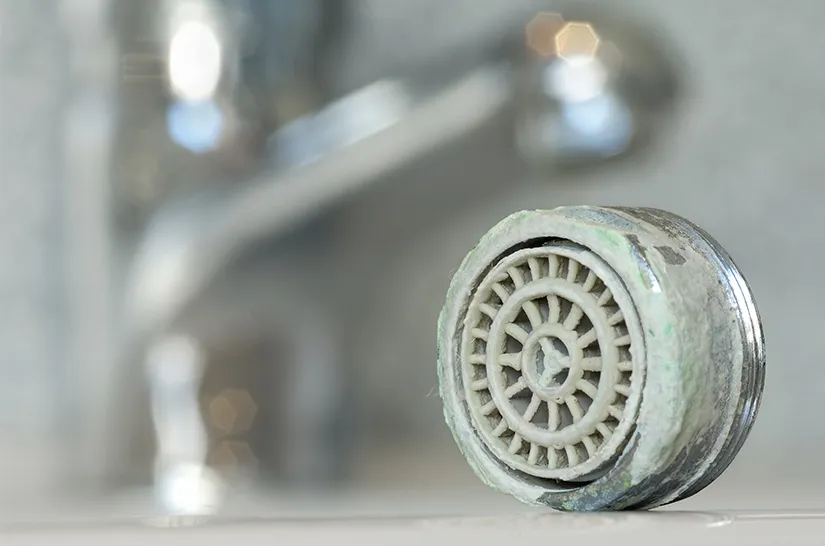Is calciferous water healthy or unhealthy? Many people ask themselves this question. The trend of preferring tap water to comparatively expensive bottled mineral water is becoming increasingly prevalent. But the lime content of drinking water often raises questions. We therefore clarify whether drinking calciferous water is unhealthy, whether it is harmful to drink the “hard” water and whether calciferous water influences health. We also show which substances in drinking water are really a cause for concern and why a water test is recommended by experts. If you test your tap water, you will find out whether there are any possible dangers in your drinking water!
Is it harmful to drink calciferous water?
The lime content of tap water is called the degree of hardness. This article addresses whether water containing lime is unhealthy or even harmful to the human organism. For many people, tap water is an excellent alternative to bottled water. For one thing, you don’t have to carry crates of bottled water to your home. In addition, it is much cheaper than mineral water in direct comparison. However, very few people are sure whether tap water is suitable for drinking. Apart from contamination by heavy metals or microbiological pollution, which mainly takes place in household pipes, the lime content in tap water is also a factor that makes many people still reach for bottled water. But is hard water harmful and, therefore, really a reason to prefer drinking mineral water?
The answer: “hard” water, i.e. tap water with a higher degree of hardness and is therefore more calcareous, can also be drunk without hesitation.
Is lime in water a danger to the heart?
There is a widespread misconception that drinking water containing lime promotes calcification of the arteries. However, experts agree that this is definitely not the case. According to an article for the German Heart Foundation website by Prof. Dr. Klepzig, the intake of lime via water and the calcification of the coronary arteries are, therefore, not connected.
The answer is no. While smoking, persistently high blood pressure or obesity are typical risk factors that can lead to heart disease or clearly promote it, hard water is not one of the triggers of heart disease.
Is hard water harmful?
The taste often recognises the difference between “soft” and “hard” water. Apart from this aspect, however, where personal taste is decisive, hard water has no more harmful effect on the organism than soft water.
Lime consists of magnesium and calcium. These two minerals are essential for the human body. Calcium, for example, is vital for bone and tooth formation, and magnesium plays a critical role in muscle and bone health. Accordingly, calciferous water can even be seen as a useful dietary supplement.
Incidentally, a common misconception: arteriosclerosis, colloquially known as “calcification”, is often wrongly associated with the consumption of hard water. In fact, however, this disease, in which harmful deposits in arteries become a problem, is mainly triggered by certain fats that we ingest with our food.
The answer is no, either! Hard water is by no means dangerous.
What does calciferous water do to skin and hair?
The degree of hardness of water also influences skin and hair. After washing with very hard water, hair can become brittle and rough and dry skin can become a problem. In this case, it makes sense to use appropriate care products.
Do we need calciferous water to stay healthy?
Scientific findings show that we absorb the main requirement of magnesium and calcium through foods such as milk, bananas or some vegetables. Only a fraction of the minerals in water are metabolised by the body. However, this excess is not harmful – it is excreted by the organism.
To cause problems, an extensive amount of lime would have to be ingested. This could lead to the organism’s inability to excrete the unusable amount due to the high concentration. However, taking in such quantities via our drinking water is almost impossible.
The answer is: not necessarily. Only a fraction of the minerals in drinking water are metabolised by the body.
Test your tap water for lime content and pollutants to ensure it’s safe to drink
- Order a water test in the IVARIO online shop and take the sample yourself.
- View analysis values and recommendations for action after a short time.
- Expert advice included!
Determine your own water hardness – water test for calcium, magnesium and hardness, heavy metals & bacteria from IVARIO.
Consumers can have their water hardness tested with this simple laboratory water test kit and thus gain clarity and certainty about their own water hardness. In addition to water hardness, you can determine whether tap water is contaminated with heavy metals and bacteria. A drinking water test not only protects your household appliances but also your own health.
Should you filter calciferous water?
From a health point of view, it is not absolutely necessary to filter water containing lime. However, various arguments may speak in favour of filtering calciferous water. These include, for example, the protection of appliances and fittings. After all, limescale builds up stubbornly and can clearly reduce the lifespan of washing machines, coffee machines and similar appliances. Limescale deposits on bathroom and kitchen fittings are also annoying. However, the water must be filtered to counteract these two factors before it reaches the taps or appliances. This is only possible with correspondingly high effort, so this alternative is rather uninteresting for many households, and regular descaling of appliances and fittings is preferred instead.
The answer: Not from a health point of view. However, a water filter can improve the taste of tap water.
So what can be done about lime-containing water?
If the lime content is exceptionally high, the taste of the water can also suffer. In addition, the water becomes cloudy to a certain extent. If consumers want to avoid using this water for drinking, table water filters are an option. However, the quality of the device should be carefully checked. Various tests in the past have shown that table water filters can become a breeding ground for germs and pathogens.
Conclusion: Limescale-containing water is not unhealthy – but caution is still advisable
Experts recommend analysing your tap water for bacteria, germs, pathogens, and heavy metals such as lead or copper. Dangers lurk here much more often than consumers generally think. Old pipes (made of lead, for example), dead pipes, maintenance errors, and various other areas can cause problems and damage health in the long term. This is especially true, but not only if babies or small children live in the household.
Therefore, “Is hard water unhealthy?” can be answered with a clear no; it isn’t.


